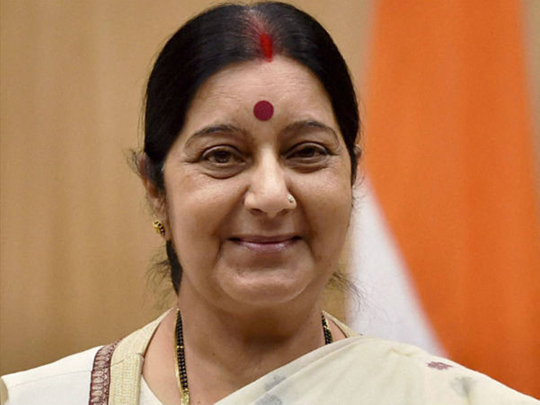
Diplomacy often witnesses unusual spats. There was the Pig and Potato War of 1859, the Affair of the Dancing Lamas in 1924, and the Bogota Bracelet incident of 1970 to name just a few. But few were more surprising than the just-concluded Episode of the Offensive Doormats.
The e-commerce giant Amazon — which has lately been cultivating India as the next frontier of its global expansion, reflected in plans to invest $5 billion (Dh18.39 billion) in the country — was recently startled by a series of intemperate tweets from Indian External Affairs Minister Sushma Swaraj. In just a few 140-character messages, Swaraj denounced the company and threatened to cancel its employees’ visas and refuse visas to its executives in the future.
What provoked Swaraj’s outburst was a Twitter user’s complaint to her that the Amazon Canada website offered for sale doormats depicting the Indian flag. The notion that dirty shoes would be wiped on a representation of the Indian flag had outraged the tweeter, Atul Bhobe, who contacted — and found an advocate in — Swaraj.
Amazon was swift to respond. After clarifying that the offending doormats were technically being offered by a third-party supplier, not Amazon itself, the company removed them from the Amazon Canada website and “implemented measures to ensure that these products could not be sold on any of our other marketplaces or websites”. Amazon’s India country manager offered an apology to Swaraj for “hurting Indian sensibilities” and, recalling the company’s $5 billion investment commitment, reiterated Amazon’s dedication to the country.
Less than 24 hours after the doormat crisis erupted, the matter was defused. But the episode raises a number of broader issues that won’t disappear so quickly.
The first issue is Swaraj’s use of Twitter. Swaraj stands out among her peers in India for her trigger-happy approach to tweeting (though her use of the platform is still dwarfed by that of US President Donald Trump, who often uses Twitter as a bully pulpit).
I certainly do not oppose the use of Twitter by public officials. On the contrary, I view the growing comfort of government ministers with social media as a matter for celebration. It is a welcome change from my time as minister of state for external affairs, under the previous Indian government at the Centre, when official computers were barred from accessing social media and the tweets I issued from my own devices would often become the stuff of needless controversy.
But Swaraj may well be going too far, responding to every individual case of a lost passport or delayed visa tweeted to her — an approach that has earned her the not-entirely-flattering sobriquet of “India’s Minister for Consular Affairs”. That a foreign minister would respond to a Twitter complaint on such trivial matters, some would argue, seems to indicate that she lacks more important things to do. (The suggestion undoubtedly reflects the fact that, under Prime Minister Narendra Modi, substantive foreign policy is conducted largely by him and his office, rather than by the External Affairs Ministry that Swaraj leads.)
But the problem extends beyond Swaraj’s communication with ordinary citizens. In the recent doormat drama, she also used Twitter to issue instructions to her own diplomats, tweeting at the Indian High Commission in Canada to deal with the “unacceptable” matter, by taking it up with Amazon “at the highest level”. Such a move is unprecedented, and not particularly welcome. Social media is no substitute for a diplomatic cable.
Also less than diplomatic was the language Swaraj used in her warning to the company. “Amazon must tender unconditional apology,” she tweeted. “They must withdraw all products insulting our national flag immediately. If this is not done forthwith, we will not grant Indian Visa to any Amazon official. We will also rescind the Visas issued earlier.” A profession famed for summoning ambassadors for a discreet dressing-down has been reduced to upbraiding companies on Twitter.
The final issue that the doormat incident brought to the fore is Indians’ tendency to take offence at the slightest affront — a tendency that is now being elevated, by the thumbs of a top minister, to the level of official policy. Of course, disrespect for the national flag is derided in most countries, and has been a criminal offence in India since 1971, with the adoption of the Prevention of Insults to National Honour Act, which threatens whoever “mutilates, defaces, disfigures, destroys, tramples upon or otherwise shows disrespect to” the Indian flag with imprisonment.
But Indians have a particularly low threshold for what qualifies as disrespect. Whereas in other democracies, flags are used freely and harmlessly on T-shirts, boots, bikinis and even underwear, in India, the majesty of the flag can, it seems, be tarnished by any tawdry manufacturer of gewgaws.
And it’s not just the flag. Last year, Amazon enraged many Indians by offering doormats with pictures of Indian deities, prompting the furious hashtag #BoycottAmazon. Two years earlier, the company’s website had caused a similar outrage by selling women’s leggings with images of Hindu deities.
So Amazon is no stranger to the anger of offended Indians. But the company’s swift capitulation in the latest incident — which will surely not be the last — shows that the value of a gigantic market like India far outweighs that of any single product. China has already proved that it can dictate terms to multinationals that covet its vast market. India, it seems, will follow suit. But whoever has emerged as the winner in the doormat debacle — outraged Twitter users, perhaps — diplomacy has been the loser.
— Project Syndicate, 2017
Shashi Tharoor, a former UN under-secretary general and former Indian minister of state for external affairs and minister of state for human resource development, is currently chairman of the Parliamentary Standing Committee on External Affairs and an MP for the Indian National Congress.









